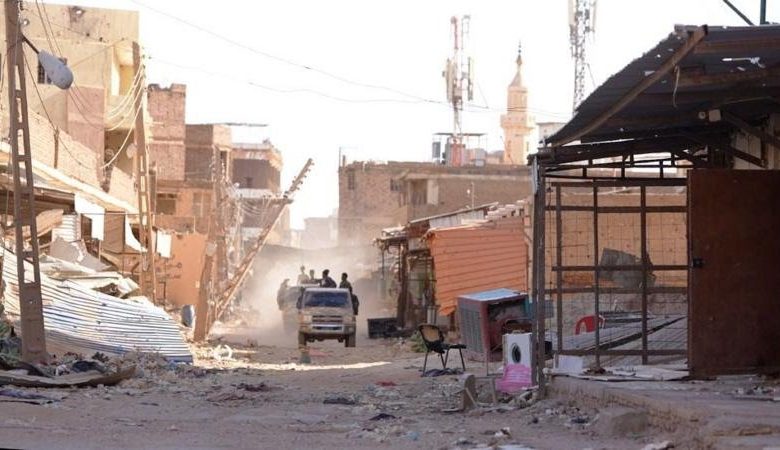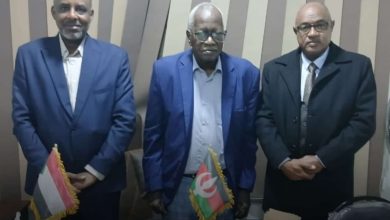Famine Looms in Sudan as Civil War Survivors Speak of Killings and Rapes

Sudan Events – Agencies
A BBC News team arrived at the front lines in Omdurman to reveal the extent of the suffering experienced by those stranded there and monitor the war diaries.
The report says that three-year-old Manasek suffers from severe malnutrition – and her mother, Ikram, says that food prices have risen dramatically.
Civilians trapped in Sudan’s civil war have given graphic accounts to the BBC of rapes, ethnic violence and street executions. Our journalists have had access to the front lines of fighting near the capital, Khartoum.
Senior UN officials said the conflict had plunged the country into “one of the worst humanitarian nightmares in modern history” and could lead to the world’s largest hunger crisis.
There are also fears of the possibility of a repeat of what the United States called genocide 20 years ago in Darfur, in the west of the country.
As if a huge explosion came out of nowhere, shaking the road in Omdurman. People are screaming and running in all directions shouting: “Go back, go back, there will be another one.” Thick smoke covers everything.
Moments before, the devastated street was full of passersby picking up rice, bread and vegetables from stores, which had only recently begun to reopen.
In mid-February, the Sudanese army retook the city, one of three cities located along the Nile River that make up Khartoum, the wider capital of Sudan.
Civilians have now begun to return, but mortar shells, like the one that fell in the middle of this main street, continue to fall daily.
For international media, access to coverage of the civil war that broke out last April has been difficult, but the BBC has managed to get to the frontline.
Our team found that the once bustling heart of Omdurman had turned into a sparsely populated wasteland.
Most of the vehicles driving the damaged streets of Omdurman are military.
The violent power struggle between the country’s military and its former ally, the paramilitary group the Rapid Support Forces (RSF), has left at least 14,000 people dead across the country – and perhaps many more.
Battles have been taking place between the army and the RSF for nearly a year to control Khartoum and neighboring cities.
The RSF took control of areas south of the capital, as well as large areas of Darfur, which has been witnessing unrest for years due to violence between various African and Arab communities.
Women who fled from Darfur to neighboring Chad told the BBC of being raped – sometimes multiple times – by militiamen. Men in the camps told us they had escaped executions and kidnappings in the streets.
The BBC team, on the front line with the army in Omdurman, was under close surveillance. We had a guard with us and were not allowed to photograph military activity.
The army fears the leakage of information related to its activities
As our photographer began photographing the aftermath of the mortar explosion, armed men in civilian clothes surrounded him, one of whom pointed a gun at his head.
It turns out to belong to Military Intelligence, but that’s a sign of how high tensions are.
Despite the army’s recent gains in Omdurman, we still hear sounds of gunfire across the region from time to time.
Temporary graves
Stones and tablets bearing numbers mark burial sites on a plot of land near a mosque in Omdurman
Part of the front line now extends along the Nile River, which separates Khartoum on the eastern side from Omdurman, located to the west of the river.
The army told us that RSF snipers are stationed in residential buildings across the water from Sudanese army positions in the parliament building, which was badly damaged.
Destruction of Omdurman market
Omdurman’s old market, once bustling with locals and visitors, is in ruins, its shops looted. Most vehicles on the roads are military.
More than three million people have fled Khartoum State in the past eleven months, but some Omdurman residents have refused to leave. Most of the people we meet are elderly people.
“There is only me left,” says Mukhtar Al-Badri Mohieddin, as he lists the friends and acquaintances now buried.
Less than a kilometer from the front line, Mukhtar Al-Badri Mohieddin walks with a cane near a mosque with a destroyed minaret.
The open space opposite is covered with makeshift graves – rough earth mounds with broken bricks, slabs and concrete slabs.
“There are 150 people here. I know many of them, Mohammad, Abdullah and Jalal,” he says, pausing for a long moment before one name, Dr. Youssef Al-Habr, the well-known professor of Arabic literature.
“It’s just me,” he adds.
Many accuse the Rapid Support Forces of committing looting and launching attacks against them during their period of control over the region.
Mohammad Abdul Muttalib, a resident, told us: “They looted the contents of the houses, stole cars and televisions, and beat the elderly, even women. People died of hunger. Some bodies were taken out of the houses so that they would not rot.”
He stressed that it has become widely known that “women have been raped in their homes and subjected to harassment during security inspections.
“Weapon for revenge”
Afaf Mohammad Salem, in her late fifties, was living with her brothers in Khartoum when the war broke out. She moved across the river to Omdurman after being attacked by RSF fighters, who, as she described, “looted the house and shot her brother in the leg.”
“They beat women and old men and threatened young girls,” she says. In an implicit reference to sexual violence, a prohibited topic in Sudan, she explained, “Insulting honor is more harmful than taking money.”
Rape victims suffer lifelong stigma and marginalization from their families and communities. Therefore, many people in Omdurman did not want to discuss this issue.
But the situation in the sprawling refugee camps on the border with Chad, 1,000 kilometers to the west of Omdurman, reveals the scale of sexual violence according to testimonies – and reveals a new and grim rate of atrocities that are beginning to unfold, and the willingness of victims to break barriers and speak out to expose what happened.
The United Nations has documented 120 cases of conflict-related sexual violence across the country, but says it never reflects reality.
Reports say that individuals wearing Rapid Support Forces uniforms are responsible for more than 80 percent of these attacks.



